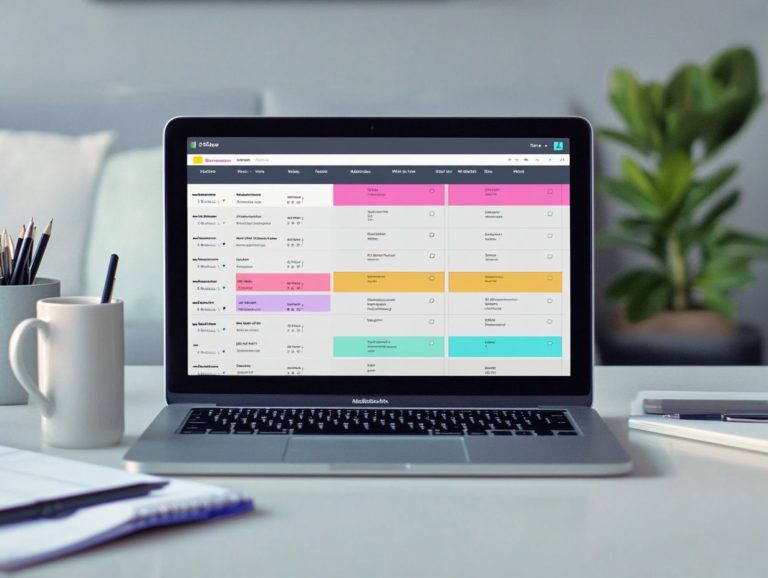the role of task management tools in project success
In today s fast-paced work environment, effective task management is essential for your project’s success. Task management tools are vital for organizing, prioritizing, and tracking tasks, ensuring that your team remains on course.
This article delves into what task management tools are and why they hold such significance in project management. You ll discover the various types of tools available, how to select the right one for your needs, and the best practices for seamless integration. Dive in now to discover how to empower your projects to thrive!
Contents
- Key Takeaways:
- Understanding Task Management Tools
- Importance of Task Management in Project Success
- Types of Task Management Tools
- Choosing the Right Task Management Tool
- Integrating Task Management into Project Management
- Measuring the Impact of Task Management Tools on Project Success
- Key Metrics and Evaluation Methods
- Frequently Asked Questions
- What are task management tools and why are they important for project success?
- How do task management tools contribute to project success?
- What features should I look for in a task management tool for project success?
- What are some popular task management tools used for project success?
- How can task management tools help with project planning?
- Are there any potential drawbacks to using task management tools for project success?
Key Takeaways:

- Task management tools help teams stay organized and meet deadlines.
- Choose a tool that fits your project and team needs.
- Integrating these tools improves communication and project efficiency.
Understanding Task Management Tools
Task management tools are essential in project management. They allow you to organize tasks with precision, set deadlines effortlessly, and enhance communication across your team.
These tools enable you to track, allocate, and prioritize tasks. This directly influences the success of your projects by fostering effective collaboration among team members toward shared goals.
By leveraging features like Kanban boards, which are visual task management tools, and project dashboards, you can visualize workflows and manage resources with greater efficiency, ensuring that you meet deadlines while optimizing task execution.
Definition and Purpose
Task management is all about managing tasks to elevate productivity and ensure accountability in your projects. It requires a strategic approach to organizing tasks by priority, enabling your team to concentrate on what truly matters.
By setting clear priorities, you enable team members to allocate their time and resources more effectively. This ensures that critical deadlines are met without a hitch.
Effective communication nurtures collaboration and encourages team members to share their progress while addressing roadblocks. When you utilize task tracking tools, you enhance accountability by providing visibility into each member’s contributions.
This clarity not only sets expectations but also fosters a strong sense of ownership in the project’s success.
Importance of Task Management in Project Success
The significance of task management in achieving project success is paramount. Understanding what makes a great task management tool establishes the foundation for effective planning, execution, and monitoring of your project objectives.
Task management enables you to allocate resources efficiently, meet deadlines, and keep your team members engaged and accountable throughout the project lifecycle.
By cultivating an atmosphere of clear communication and diligent task tracking, you have the opportunity to enhance productivity, mitigate risks, and elevate the overall performance of your project.
How Task Management Tools Contribute
Task management tools play a pivotal role in enhancing your project management efforts. Understanding why your team needs a task management tool can boost team engagement, streamline progress tracking, and elevate project visibility.
These platforms seamlessly integrate various functionalities that promote efficient collaboration among your team members. For example, deadline reminders ensure that crucial milestones are never missed, fostering a sense of accountability within the group.
The ability to assign tasks based on individual strengths helps create a balanced workload, significantly boosting productivity. By automating workflow processes, these tools reduce manual errors and save you precious time.
This allows your team to concentrate on innovative solutions rather than getting bogged down by administrative tasks. Altogether, these features help you achieve specific project objectives and enhance overall outcomes by cultivating a more organized and cohesive working environment.
Types of Task Management Tools

You ll find a diverse range of task management tools tailored to meet various project management needs.
These include sophisticated project software featuring Kanban boards, Gantt charts, and project dashboards, all crafted to enhance your task tracking efficiency.
Comparison and Features
Consider several important factors when comparing different task management tools: time tracking, collaboration capabilities, and communication tools are vital for your selection.
You should also think about functionalities such as task assignment, which streamline team responsibilities and clarify what each individual needs to accomplish.
Robust progress tracking systems provide real-time updates on project status, allowing your teams and stakeholders to effortlessly monitor advancements.
The reporting capabilities are crucial as well; they offer valuable insights into performance metrics, helping you identify bottlenecks and areas that need improvement.
This comprehensive feature set optimizes your project performance, enhancing communication among all parties involved.
Choosing the Right Task Management Tool
Selecting the right task management tool is crucial for successful project management. For more insights, check out understanding task management tools, as it profoundly influences your productivity and the effectiveness of your team’s collaboration.
Tips and Considerations
When evaluating task management tools, consider their ability to enhance productivity, improve task organization, and ensure accountability among your team members.
Pay close attention to the user interface; it should be intuitive and easy to navigate, enabling you and your team to adapt quickly without extensive training.
Also, explore integration capabilities with other software your team already uses. Seamless connectivity can significantly streamline your workflows. Scalability is another important factor; the tool should address your current needs and have the flexibility to accommodate future growth as project requirements evolve.
By prioritizing these aspects, you ll be well-equipped to select a tool that genuinely enhances your team s efficiency in managing projects.
Integrating Task Management into Project Management
Integrating task management into your project management processes is crucial for ensuring your teams stay aligned with the project’s goals.
This approach streamlines your workflow and boosts collaboration, enabling everyone involved to contribute effectively toward shared objectives.
Best Practices and Examples

Implementing best practices in task management can significantly elevate your project outcomes by enhancing task metrics and streamlining your processes.
For instance, companies that embrace tools like Asana and Trello popular task management tools that help teams organize their work frequently report a noticeable surge in team productivity, with some witnessing a remarkable 25% reduction in project completion times.
By leveraging features such as automated reminders and progress tracking, you can maintain clarity on deadlines and responsibilities. This ensures timely project delivery and boosts overall team morale don t miss out on the chance to enhance your project outcomes!
One corporation even noted an impressive 30% improvement in resource allocation efficiency after adopting a comprehensive task management framework. This illustrates that effective strategies can produce tangible results while fostering a more collaborative work environment.
Measuring the Impact of Task Management Tools on Project Success
Measuring the impact of task management tools on project success involves identifying key metrics and employing strong evaluation methods that accurately reflect productivity and team performance.
By focusing on these essential elements, you can gain valuable insights into how these tools enhance your project’s outcomes.
Key Metrics and Evaluation Methods
Key metrics such as task efficiency, team engagement, and project performance are crucial for evaluating how task management tools impact overall project success.
By using various evaluation methods, you can gain valuable insights into these metrics. Detailed reporting not only provides a snapshot of current progress but also helps identify areas that need improvement.
Regular task reviews allow your team to assess workflows and identify any obstacles that could hinder performance. This promotes a proactive approach to problem-solving.
Understanding how these methods enhance your collective effort ensures that the project stays on track, aligns your initiatives with desired outcomes, and boosts overall effectiveness.
Frequently Asked Questions
What are task management tools and why are they important for project success?
Task management tools are applications that help individuals and teams organize, prioritize, and track their tasks and projects. They are vital for project success as they streamline processes, enhance efficiency, and foster collaboration among team members.
How do task management tools contribute to project success?

Task management tools improve communication and coordination among team members. They ensure tasks are completed on time and provide a centralized location for project information and progress tracking.
What features should I look for in a task management tool for project success?
Here s what to look for to ensure your tool drives success: task assignment and delegation, setting deadlines and priorities, progress tracking, collaboration tools, and integration with other project management software.
What are some popular task management tools used for project success?
Popular task management tools include Trello, Asana, Basecamp, and Wrike. These tools offer a range of features to help teams stay organized and on track with their projects.
How can task management tools help with project planning?
Task management tools assist in project planning by providing a visual representation of tasks and timelines. This allows for better prioritization, resource allocation, and facilitates communication and collaboration during the planning process.
Are there any potential drawbacks to using task management tools for project success?
While task management tools offer many benefits, they may also have drawbacks. Team members may face a learning curve, there could be added costs for premium features, and an overreliance on the tool might lead to reduced flexibility in project management.





